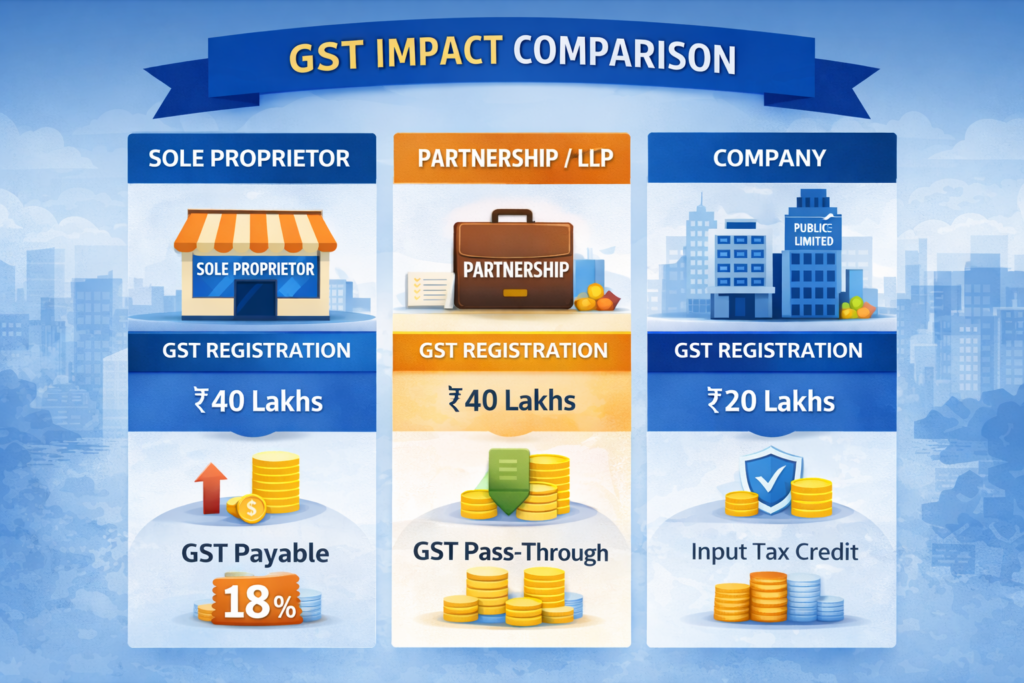Introduction
Choosing the right business entity is one of the most critical legal decisions for any entrepreneur in India. Before starting operations, hiring employees, or raising capital, a business must be registered under a legally recognized structure. Therefore, understanding how to choose the right business structure is essential for compliance, tax efficiency, and long-term growth.
India offers multiple business structures under different laws. Each structure differs in terms of liability, taxation, ownership, compliance requirements, and scalability. As a result, selecting an unsuitable structure can lead to higher taxes, legal exposure, compliance penalties, and operational limitations.
This guide provides a professional and legal overview of all major business entities in India. It also explains how to choose the right business structure based on business objectives, risk exposure, and regulatory obligations.
What Is a Business Entity?
A business entity is a legally recognized organization created to carry out business activities under Indian law. In India, no business can operate lawfully without registration under a valid structure. Therefore, understanding how to choose the right business structure is a critical step for every entrepreneur and organization.
Each business entity defines the legal identity of the business and clearly separates the rights and responsibilities of its owners. It determines the extent of owner liability, applicable tax treatment, statutory compliance requirements, and the ability to raise funds from investors or lenders. Moreover, the correct business entity improves legal protection, enhances market credibility, and supports long-term operational clarity. Choosing the right structure helps businesses reduce legal risks and operate with confidence and compliance.
Why Choosing the Right Business Structure Is Important
The decision regarding how to choose the right business structure affects the business throughout its lifecycle. From incorporation to closure, the structure governs every legal and financial aspect.
Key reasons why this decision matters include:
- Legal liability: Some entities protect personal assets, while others do not
- Tax efficiency: Tax rates vary significantly across entities
- Regulatory compliance: Compliance costs differ by structure
- Investment readiness: Investors prefer certain entities
- Business continuity: Some entities survive ownership changes
A well-chosen business entity reduces future legal disputes and restructuring costs.
According to the Ministry of Corporate Affairs (MCA), more than 1.6 million companies are registered in India, while LLPs and partnerships are growing at over 12% annually. This data clearly shows that entrepreneurs are actively evaluating how to choose the right business structure based on evolving business needs.
Types of Business Entities Available in India
Sole Proprietorship
A Sole Proprietorship is the simplest and most common business entity in India. It is owned, managed, and controlled by a single individual. Legally, there is no distinction between the owner and the business. Therefore, the proprietor bears full responsibility for profits, losses, and liabilities. This structure requires minimal registration, usually limited to local licenses and tax registrations. When learning how to choose the right business structure, many small entrepreneurs prefer proprietorships due to low compliance and easy setup. However, unlimited personal liability remains a major risk, as personal assets can be used to settle business debts. Due to limited credibility and funding options, this business entity suits small-scale businesses, freelancers, and local service providers with low financial risk.
| Advantages | Disadvantages |
|---|---|
| Easy and inexpensive to start | Unlimited personal liability |
| Minimal legal and compliance requirements | Limited access to funding and credit |
| Complete control over business decisions | Low business credibility |
| Full retention of profits | No continuity after owner’s death |
| Simple tax filing under individual slabs | Limited growth and scalability |
Partnership Firm
A Partnership Firm is a traditional business entity formed when two or more individuals agree to run a business together and share profits. It is governed by the Indian Partnership Act, 1932, and operates based on a partnership deed. While registration is optional, a registered firm enjoys better legal enforceability. When considering how to choose the right business structure, partnerships work well for small professional or family-run businesses. However, partners have unlimited and joint liability, meaning one partner’s actions can legally bind others. Although compliance remains simple and cost-effective, partners often face disputes and limited scalability. This business entity suits ventures where partners maintain strong mutual trust, and shareI shared responsibility.
| Advantages | Disadvantages |
|---|---|
| Easy formation with shared ownership | Unlimited and joint liability of partners |
| Shared capital and responsibility | Risk of disputes between partners |
| Suitable for small professional firms | Limited fundraising options |
| Operational flexibility | No separate legal identity |
| Suitable for small professional firms | Dissolution upon partner exit or death |
Limited Liability Partnership (LLP)
A Limited Liability Partnership (LLP) is a modern business entity that combines the flexibility of a partnership with the benefits of limited liability. Governed by the LLP Act, 2008, it has a separate legal identity from its partners. This structure protects personal assets, making it an attractive option when evaluating how to choose the right business structure for professional services. LLPs require registration with the Ministry of Corporate Affairs and annual compliance filings. While taxation remains at a flat rate, compliance costs are lower for companies. However, LLPs face restrictions in raising equity funding. This business entity is ideal for consultants, lawyers, chartered accountants, and service-based firms seeking legal protection with operational flexibility.
| Advantages | Disadvantages |
|---|---|
| Limited liability protection for partners | Mandatory annual MCA filings |
| Separate legal identity | Penalties for non-compliance |
| Lower compliance than companies | Limited access to equity funding |
| Flexible management structure | Higher compliance than partnerships |
| Suitable for professional services | Less preferred by venture investors |
Private Limited Company
A Private Limited Company is one of the most preferred business entities in India, especially for startups and growing businesses. Governed by the Companies Act, 2013, it has a separate legal identity and provides limited liability to shareholders. When understanding how to choose the right business structure, private companies stand out for their ability to raise funds, attract investors, and scale operations. Compliance requirements include annual filings, audits, and board meetings, which increase operational costs. However, enhanced credibility, perpetual succession, and investment readiness outweigh these challenges. This business entity is best suited for startups, technology companies, and businesses aiming for long-term growth and external funding.
| Advantages | Disadvantages |
|---|---|
| Separate legal entity | Higher compliance costs |
| Limited liability for shareholders | Mandatory audits and filings |
| Easy access to funding and investors | Restrictions on share transfer |
| High business credibility | Complex incorporation process |
| Perpetual succession | Increased regulatory oversight |
Public Limited Company
A Public Limited Company is a business entity designed for large-scale operations and public fundraising. It allows companies to raise capital by issuing shares to the public and listing on stock exchanges. Governed by the Companies Act, 2013, and regulated by SEBI, it requires strict compliance and disclosure. When deciding how to choose the right business structure, public companies are suitable only for mature businesses with strong governance frameworks. While shareholders enjoy limited liability and access to large capital, regulatory oversight and compliance costs are significantly high. This business entity is ideal for large corporations planning expansion through public investment and capital markets.
| Advantages | Disadvantages |
|---|---|
| Ability to raise capital from public | Extensive legal and regulatory compliance |
| Limited liability for shareholders | High operational and disclosure costs |
| High market credibility | SEBI regulations apply |
| Share transferability | Loss of management control |
| Strong corporate governance | Complex incorporation and management |
One Person Company (OPC)
A One Person Company (OPC) is a unique business entity that allows a single entrepreneur to enjoy the benefits of a corporate structure. Introduced under the Companies Act, 2013, it provides limited liability and a separate legal identity. When learning how to choose the right business structure, OPCs are ideal for solo founders seeking legal protection without partners. However, OPCs face restrictions on growth and mandatory conversion once turnover thresholds are crossed. Compliance requirements are higher than those of proprietorships but lower than those of private companies. This business entity suits individual professionals, consultants, and small business owners planning gradual expansion.
| Advantages | Disadvantages |
|---|---|
| Limited liability for single owner | Mandatory conversion after turnover limits |
| Separate legal identity | Higher compliance than proprietorship |
| Better credibility than proprietorship | Restricted fundraising options |
| Full control with legal protection | Only one shareholder allowed |
| Perpetual succession | Limited scalability |
Section 8 Company
A Section 8 Company is a non-profit business entity formed for charitable, educational, or social welfare objectives. Governed by the Companies Act, 2013, it cannot distribute profits to its members. When evaluating how to choose the right business structure for social initiatives, Section 8 Companies offer strong credibility and tax benefits. However, registration is complex and requires government approvals. Regular audits and strict compliance are mandatory. Despite these challenges, NGOs, foundations, and organizations receiving CSR funding widely use this business entity because it offers a transparent legal framework.
| Advantages | Disadvantages |
|---|---|
| Tax exemptions available | Complex registration process |
| High legal credibility | Strict compliance and audits |
| Eligible for CSR funding | No profit distribution allowed |
| Separate legal entity | Government approvals required |
| Promotes social welfare | Limited operational flexibility |
Hindu Undivided Family (HUF)
A Hindu Undivided Family (HUF) operates as a traditional business entity recognized under Hindu law. The Karta, usually the eldest family member, manages the HUF and oversees its coparceners.
HUFs enjoy a separate tax identity, making them useful for tax planning. When considering how to choose the right business structure, HUFs suit family-owned businesses with inherited assets. However, internal disputes and limited scalability remain major drawbacks. Decision-making power rests largely with the Karta, which may cause conflicts. This business entity is best for traditional family businesses operating within a close-knit structure.
| Advantages | Disadvantages |
|---|---|
| Separate tax identity | Limited to Hindu families |
| Tax planning benefits | Risk of internal family disputes |
| Easy formation | Limited scalability |
| Family asset pooling | Decision-making concentrated with Karta |
| Continuity through generations | Difficult dissolution |
Cooperative Society
A Cooperative Society is a member-driven business entity formed for mutual benefit under the Cooperative Societies Act, 1912. It operates on democratic principles, with equal voting rights for members. When understanding how to choose the right business structure, cooperatives suit collective economic activities rather than profit-driven ventures. Although members enjoy limited liability, capital generation remains limited. Government involvement may also slow decision-making. This business entity is commonly used for housing societies, agricultural cooperatives, and credit societies focused on shared welfare.
| Advantages | Disadvantages |
|---|---|
| Democratic management | Limited capital generation |
| Limited liability for members | Slow decision-making |
| Promotes mutual benefit | Government interference |
| Government support available | Lower profitability focus |
| Suitable for collective activities | Complex regulatory framework |
Trust and Society
Trusts and societies operate as non-commercial business entities formed for charitable, religious, or educational purposes. The Indian Trusts Act, 1882, governs trusts, while the Societies Registration Act, 1860, regulates societies. When learning how to choose the right business structure for social objectives, these entities offer tax exemptions and public credibility. However, they cannot distribute profits or engage in commercial activities. Strict compliance, audits, and reporting are mandatory. This business entity is ideal for schools, charities, and social welfare organizations.
| Advantages | Disadvantages |
|---|---|
| Tax exemptions for charitable purposes | Cannot operate for profit |
| Public credibility and trust | Strict compliance and reporting |
| Easy formation for social causes | Limited funding sources |
| Separate legal recognition | Government oversight |
| Suitable for education and welfare | No personal financial benefit |

How to Choose the Right Business Structure: Key Legal Factors
Nature and Scale of Business
The first step in deciding how to choose the right business structure is understanding the nature and scale of the business. Small businesses, freelancers, and local service providers usually benefit from simple structures such as sole proprietorships or partnerships. These business entities are easy to manage and involve minimal compliance. However, businesses with growth plans, multiple stakeholders, or expansion goals require scalable entities like LLPs or companies. Choosing a structure aligned with business size helps avoid future restructuring and legal complications.
Liability Protection
Liability exposure is a critical legal factor when selecting a business entity. In high-risk businesses, owners must protect personal assets from business losses. Structures such as LLPs and companies provide limited liability, meaning owners are not personally responsible for business debts. In contrast, proprietorships and partnerships expose owners to unlimited liability. Therefore, businesses operating in regulated or capital-intensive sectors should prioritize liability protection.
Tax Considerations
Tax treatment varies across business entities and directly affects profitability. Proprietorships follow individual tax slabs, while partnerships and LLPs are taxed at a flat rate. Companies are subject to corporate tax regimes. Understanding these differences is essential when evaluating how to choose the right business structure, as improper selection may result in higher tax burdens and reduced cash flow.
Compliance Requirements
Compliance obligations differ significantly between structures. Companies face strict requirements, including audits, annual filings, and board meetings. Partnerships and proprietorships have fewer legal obligations. Selecting a business entity that matches compliance capacity helps maintain legal consistency and reduces penalties.
Funding and Investment Needs
Funding requirements strongly influence entity selection. Investors and venture capitalists prefer private and public limited companies due to transparency and governance standards. Businesses planning external funding should select investor-friendly structures from the beginning.
Understanding these legal factors ensures informed and compliant decision-making when choosing the right business structure.
Legal Compliance Requirements for Business Entities
| Entity Type | Key Compliance |
|---|---|
| Proprietorship | Local licenses |
| Partnership | Partnership deed |
| LLP | Annual MCA filings |
| Company | ROC filings, audits |
| Business Entity | Applicable Tax Rate | Tax Basis | Key Tax Considerations |
|---|---|---|---|
| Sole Proprietorship | As per individual income tax slabs | Individual income | Higher income leads to higher slab rates; surcharge and cess apply |
| Partnership Firm | 30% flat rate + surcharge & cess | Business profits | Partner remuneration and interest allowed as deductions |
| Limited Liability Partnership (LLP) | 30% flat rate + surcharge & cess | Business profits | No dividend distribution tax; simpler tax structure |
| Private Limited Company | 22% or 30% + cess | Corporate income | Concessional rates available if exemptions are forgone |
| Public Limited Company | 22% or 30% + cess | Corporate income | Subject to MAT if opting for old regime |
| One Person Company (OPC) | 22% or 30% + cess | Corporate income | Taxed same as private limited companies |
| Section 8 Company | Nil or concessional (subject to conditions) | Income applied for charitable purposes | Tax exemptions available under Income Tax Act |
| Hindu Undivided Family (HUF) | As per HUF income tax slabs | Family income | Separate PAN and deductions available |
| Cooperative Society | 10%–30% (varies by income) | Business income | Concessional rates under Section 115BAD |
| Trust / Society | Nil (subject to exemptions) | Charitable income | Must comply with registration and audit rules |
Conclusion:
Choosing the correct business entity is not merely a procedural step but a strategic legal decision that shapes the future of a business. Entrepreneurs who clearly understand how to choose the right business structure benefit from improved legal protection, optimized tax planning, and long-term operational stability. Each business structure serves a specific legal and commercial purpose, depending on the nature of operations, risk exposure, compliance capacity, and funding requirements. Selecting an unsuitable entity may lead to higher tax liability, regulatory penalties, or costly restructuring in the future. Therefore, businesses should seek professional guidance from a qualified legal advisor or chartered accountant before registration.
Expert advice ensures compliance with applicable laws and aligns the business entity with long-term growth objectives. Making the right choice today helps prevent legal complications and financial inefficiencies tomorrow.
References:
- Types of Business Structures in India – Ahlawat Associates – Comprehensive overview of major business entity types and their legal features.
- How to Choose the Right Business Structure – JustStart – Practical guide on comparing business structures and key factors to consider.
- Business Entity Types in India – Setindiabiz – Quick reference to legal status, governing acts, and common entity differences.
- Forms of Business Organisation in India – Maheshwari & Co. – Legal insight into different business structures and compliance implications.
- Business Entity Structures Overview – Lexology – Brief descriptions of major business entity types recognized under Indian law.
FAQs on How to Choose the Right Business Structure for Success
- 1. What is a business entity?
A business entity is a legally recognized structure under which a business operates. It defines ownership, liability, taxation, and compliance requirements.
- 2. How do I choose the right business structure in India?
To understand how to choose the right business structure, evaluate your business size, liability risk, tax impact, compliance capacity, and funding needs.
- 3. Which business entity offers limited liability protection?
LLPs, private limited companies, public limited companies, and OPCs provide limited liability, protecting owners’ personal assets from business risks.
- 4. Which business structure is best for startups?
A private limited company is often the best business entity for startups due to investor preference, scalability, and funding opportunities.
- 5. Can I change my business structure later?
Yes, businesses can convert their business entity later. However, restructuring involves legal, tax, and compliance costs, so choosing correctly at the start is advisable.




Pingback: Increase in Digital Transaction Scams in India: Security Measures
Pingback: GST Rate Changes 2025: Latest Revisions & Overall Impact
Pingback: GST Explained for Beginners: Understanding Tax Slabs in 2025
Pingback: Filing ITR Online in 2025: Step-by-Step Guide
Pingback: Top Tax Benefits for Startups and MSMEs in India (2025 Edition)
Pingback: Cross-Border Mergers & Acquisitions in India 2025: Future Outlook
Pingback: Loan Recovery Laws in India You Need to Know in 2025
Pingback: Double Taxation Avoidance Agreement (DTAA): Meaning, Benefits
Pingback: Top Legal Issues Faced by Startups in 2025: A Guide for Founders
Pingback: What is a Limited Liability Partnership (LLP)? | Complete Guide
Pingback: What Is a Prenuptial Agreement? Meaning, Benefits & Legal Guide
I was looking at some of your blog posts on this internet site and I believe this website is very instructive! Keep posting.
Great insights